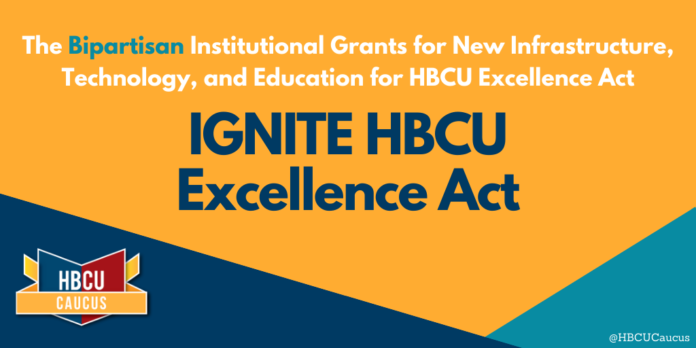
WASHINGTON, D.C. – Today, Congresswoman Alma Adams (D-NC) and Rep. French Hill (R-AR), announced 25 new cosponsors of the Institutional Grants for New Infrastructure, Technology, and Education for HBCU Excellence Act (IGNITE HBCU Excellence Act). The legislation would make historic investments in Historically Black Colleges and Universities to rectify over a century of systemic neglect.
The bill’s other original House cosponsors are Reps. Terri Sewell (D-AL) and Mike Turner (R-OH).
“I am honored that 25 more of my colleagues have signed on to support the IGNITE HBCU Excellence Act, the most transformative legislation for Historically Black Colleges and Universities ever,” said Congresswoman Adams, Founder and Co-Chair of the HBCU Caucus. “This historic, bipartisan bill continues to gain momentum in Congress. The IGNITE HBCU Excellence Act recognizes that HBCUs are essential to our recovery, and part of the critical infrastructure that our country needs to succeed in the 21st Century.”
“I am happy to see my Democratic and Republican colleagues supporting the IGNITE HBCU Excellence Act, legislation that will invest in our HBCUs and encourage private and philanthropic support,” said Rep. French Hill, Co-Chair of the HBCU Caucus. “When we invest in HBCUs and help them succeed, all of America succeeds.”
The complete list of cosponsors includes Representatives Terri Sewell, Mike Turner, Joyce Beatty, Deborah Ross, Lisa Blunt Rochester, Frederica Wilson, Jahana Hayes, Eleanor Holmes Norton, Barbara Lee, Anthony Brown, Marilyn Strickland, Sanford D. Bishop, Jr., Mary Gay Scanlon, Kweisi Mfume, Mary Gay Scanlon, Nikema Williams, Stacey E. Plaskett, A. Donald McEachin, Andre Carson, Eddie Bernice Johnson, Val Demings, Brian Fitzpatrick, Kathy Manning, Jim Cooper, Steve Cohen, Danny K. Davis, and Jamaal Bowman. Additionally, the bill is endorsed by organizations including NAFEO, TMCF, and UNCF.
While only representing roughly 3 percent of all four-year colleges and universities, HBCUs produce upwards of 17 percent of all bachelor’s degrees awarded to African Americans. Additionally, HBCUs enroll a disproportionately high percentage of first generation and low-income students, nearly 60 percent, and outperform their peers in supporting and graduating these students.
The incredible success of HBCUs has been achieved despite over a century of systemic underfunding at both the state and federal levels. Too often, HBCUs are forced to navigate the effects of chronic underfunding while also lacking access to alternate sources of capital available to other institutions.
The IGNITE HBCU Excellence Act invests in infrastructure at Historically Black Colleges and Universities. This legislation recognizes the contributions of these institutions in the most important way possible: by affording them the support and investment needed to deepen their transformational work. Specifically, it would authorize funds to:
- Utilize public and private investments to renovate, repair, modernize, or construct new campus facilities, including instructional, research, and residential spaces;
- Provide access to campus-wide, reliable high-speed broadband to support digital learning and long-term technological capacity;
- Develop campus facilities to support community-based partnerships that provide students and community members with academic, health, and social services;
- Procure equipment and technology needed to facilitate high-quality research and instruction;
- Preserve buildings with historic significance; and
- Ensure the resilience, safety, and sustainability of campus facilities.
Congresswoman Alma Adams represents North Carolina’s 12th Congressional District (Charlotte, Mecklenburg County). In 2015, she founded the first bipartisan Historically Black Colleges and Universities (HBCU) Caucus in Congress. In 2019, her previous landmark legislation to invest in HBCUs, the FUTURE Act, was signed into law. She is a double graduate of North Carolina A&T, the largest HBCU by enrollment in the United States.
###








